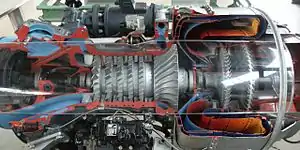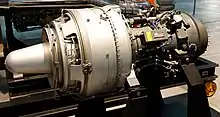| T53 | |
|---|---|
 | |
| Cutaway view of an early T53 turboprop, with single stage HP and power turbines | |
| Type | Turboshaft |
| National origin | United States |
| Manufacturer | Lycoming Engines Honeywell Aerospace Ozark Aeroworks LLC |
| First run | ~1955 [1] |
| Major applications | AH-1 Cobra Kaman K-MAX OV-1 Mohawk UH-1 Iroquois |
| Developed into | Lycoming T55 |
The Lycoming T53, (company designation LTC-1) is a turboshaft engine used on helicopters and (as a turboprop) fixed-wing aircraft since the 1950s. It was designed at the Lycoming Turbine Engine Division in Stratford, Connecticut, by a team headed by Anselm Franz, who was the chief designer of the Junkers Jumo 004 during World War II.
A much larger engine, similar in overall design, became the Lycoming T55 produced by Honeywell Aerospace. The T53 model is produced by Ozark Aeroworks LLC.
Variants
Military designations

Lycoming T53-L-1 turboshaft engine at Steven F. Udvar-Hazy Center in Virginia, USA
- T53-L-1
- T53-L-1A
- 770 hp (645 kW)
- T53-L-1B
- 860 hp (645 kW)
- T53-L-3
- T53-L-5
- 960 hp (720 kW)
- T53-L-7
- T53-L-11
- 1100 hp (820 kW)
- T53-L-13
- T53-L-13B
- 1400 shp (1044 kW) improved L-11
- T53-L-701
- 1,400 hp (1044 kW) Turboprop variant used on Mohawk and AIDC T-CH-1
- T53-L-703
- 1,800 hp (1343 kW) improved durability variant of the L-13B
Civil designations
- T5307A
- commercial L-7
- T5309A
- commercial L-9A
- T5309B
- commercial L-9B
- T5309C
- similar to T5309A but with L-11 combustion chamber
- T5311A
- 1100 shp (820 kW)
- T5313A
- 1400 shp (1044 kW) commercial variant of the L-13
- T5313B
- 1400 shp (1044 kW) commercial variant of the L-13
- T5317A
- 1500 shp (1119 kW) improved variant of the L-13
- T5317A-1
- T5317B
- T5317BCV
- LTC1B-1
- LTC1B-2
- company designation for L-1A
- LTC1F-1
- company designation for L-3
- LTC1F-2
- company designation for L-7
- LTC1K-1
- company designation for L-5
- LTC1K-2
- company designation for L-9
- LTC1K-2A
- company designation for L-9A
- LTC1K-2B
- company designation for L-9B
- LTC1K-4
- company designation for L-13
- LTC1K-4A
- for tilt-wing / tilt-rotor aircraft (Canadair CL-84 Dynavert)
- LTC1K-4K
- 1550 shp (1156 kW) direct drive variant of the L-13B
- LTC1K-5
- company designation for L-11
- Kawasaki KT5311A
- Kawasaki production for Fuji-Bell 204B helicopters
Applications
Aircraft
- AIDC T-CH-1 (T53-L-701)
- AIDC XC-2
- Bell 204B (T5311A)
- Bell 205A (T5313B)
- Bell 205A-1 (T5313B and T5317A)
- Bell AH-1 Cobra (T53-L-703)
- Bell UH-1H Iroquois (T53-L-703)
- Bell XV-15 (LTC1K-4K)
- Canadair CL-84 Dynavert
- Doak VZ-4
- F+W C-3605
- Grumman OV-1D Mohawk (T53-L-701)
- Kaman HH-43 Huskie
- Kaman K-MAX (T5317A-1)
- Ryan VZ-3 Vertiplane
- Vertol VZ-2 (YT53)
- Eagle Single (T5317A, T5317B, or T5317BCV)[2][3]
Non-aircraft
- DB Class 210, diesel railway locomotive
Specifications (T53-L-701)
Data from Flight International [4]
General characteristics
- Type: Turboshaft
- Length: 58.4 in (1,483 mm)
- Diameter: 23 in (584 mm)
- Dry weight: 688 lb (312 kg)
Components
- Compressor: 5-stage axial and 1-stage centrifugal
- Combustors: reverse flow
- Turbine: 2-stage high pressure turbine; 2-stage power turbine
Performance
- Maximum power output: 1,451 shp (1,082 kW)
- Overall pressure ratio: 7.4
- Air mass flow: 10.7 lb/s (4.853 kg/s)
- Power-to-weight ratio: 2.109 hp/lb
See also
Related development
Related lists
References
- ↑ "sir roy | roy dobson | managing director | 1955 | 1400 | Flight Archive". Archived from the original on 2017-05-17.
- ↑ "Eagle Single | Airframe Customizations | Eagle Copters". Retrieved 6 May 2020.
- ↑ "Eagle Copters Obtains U.S. FAA Certification for the Eagle Single". Retrieved 6 June 2023.
- ↑ Turbine Engines of the World, 1975
- Gunston, Bill (2006). World Encyclopedia of Aero Engines, 5th Edition. Phoenix Mill, Gloucestershire, England, UK: Sutton Publishing Limited. p. 132. ISBN 0-7509-4479-X.
External links
Wikimedia Commons has media related to Lycoming T53.
This article is issued from Wikipedia. The text is licensed under Creative Commons - Attribution - Sharealike. Additional terms may apply for the media files.